In today’s fast-paced world, slowing down has become more essential than ever. The constant hustle of daily life can negatively impact mental health and divert attention from prioritizing well-being. Yoga trends in 2024 has evolved, mindful practices like meditation and yoga have become increasingly important to incorporate into daily routines, offering long-term health benefits.
Yoga trends in 2024 has evolved to blend tradition with innovation, catering to the needs of a rapidly changing, wellness-focused society. The practice has become more dynamic, adapting to the modern world while staying true to its roots. Digital platforms and mindful practices have made yoga more accessible, showing how movement, technology, and well-being can come together harmoniously. In this context, yoga is not just about the physical movements on the mat; it’s about fostering a more connected, balanced, and healthy way of living, guiding individuals on their journey toward self-discovery and holistic wellness.
Yoga Trends of the Year:
- Desk Yoga: Tailored for office workers, desk yoga provides quick and accessible routines that help reduce stress and improve posture during work hours. It allows individuals to incorporate mindfulness and movement into their busy schedules, making it easier to stay active while at the desk.
- Face Yoga: Face yoga has gained popularity for its ability to tone facial muscles, reduce wrinkles, and promote a youthful appearance naturally. This practice focuses on exercises that stimulate and strengthen the face, offering a non-invasive alternative to traditional beauty treatments.
- Aqua Yoga: Aqua yoga is practiced in water, making it an ideal low-impact exercise. It helps enhance balance and ease joint strain, particularly for seniors and beginners. The buoyancy of the water supports the body, reducing stress on the joints while promoting flexibility and strength.
- Aerial Yoga: Aerial yoga combines yoga with aerial hammocks, offering a gravity-defying practice that improves strength, flexibility, and spinal decompression. It provides a unique way to engage the body and mind, allowing for deeper stretches and enhancing overall body awareness.
- Outdoor and Adventure Yoga: Outdoor and adventure yoga encompasses activities like paddleboard yoga, mountain retreats, and beachfront sessions, catering to yoga enthusiasts seeking unique and refreshing experiences in nature. These practices connect the mind and body to the environment, offering a change of scenery and a sense of adventure.
- Digital Yoga Experiences: Online yoga has evolved to be smarter and more interactive, with virtual reality (VR) and augmented reality (AR) allowing people to join classes from anywhere. These digital platforms can track movement, posture, and breathing, providing real-time feedback to enhance the practice and personalize the experience.
- Wellness-Focused Approaches: Mental health is increasingly becoming a key component of yoga practice. Many practitioners are now seeking emotional balance and stress relief, rather than just focusing on physical fitness. Styles like restorative and yin yoga cater to this need, helping individuals calm their minds and promote overall well-being.
- Targeted Yoga Classes: Yoga has become more specialized with targeted classes designed for seniors, pregnant women, and individuals with unique health needs. Yoga therapy is emerging as a way to manage health conditions and aid recovery, providing tailored support for specific health challenges.
- Eco-Friendly Practices: Environmental awareness is shaping current yoga trends, with practitioners opting for eco-friendly gear made from recycled materials, such as sustainable yoga mats. Many yoga communities now connect personal health with planetary health, recognizing the importance of caring for the environment alongside personal well-being.
- Technology in Yoga: Technology is playing an increasing role in yoga, with wearable devices such as smartwatches tracking breathing, heart rate, and stress levels during practice. New apps and devices also offer detailed feedback about physical and mental responses, allowing practitioners to customize their yoga experience to better suit their needs.
- Making Yoga for Everyone: Yoga classes are becoming more inclusive, designed for various body types, abilities, and backgrounds. Adaptive yoga programs ensure that individuals with physical limitations can participate, making yoga accessible to everyone, regardless of their starting point.
- Cultural Understanding: There is growing respect for yoga’s cultural and philosophical roots. Practitioners are learning about the history and traditions behind yoga, viewing it as more than just a form of exercise. This approach values the deep wisdom and teachings that yoga offers beyond physical practice.
- Ongoing Transformation: Yoga continues to evolve, adapting to changes in technology, societal needs, and people’s views on health. What began as a physical exercise has transformed into a holistic practice that encompasses all aspects of human wellness, highlighting its ongoing transformation and relevance in modern life.
Disclaimer:
The information contained in this article is for educational and informational purposes only and is not intended as a health advice. We would ask you to consult a qualified professional or medical expert to gain additional knowledge before you choose to consume any product or perform any exercise.







